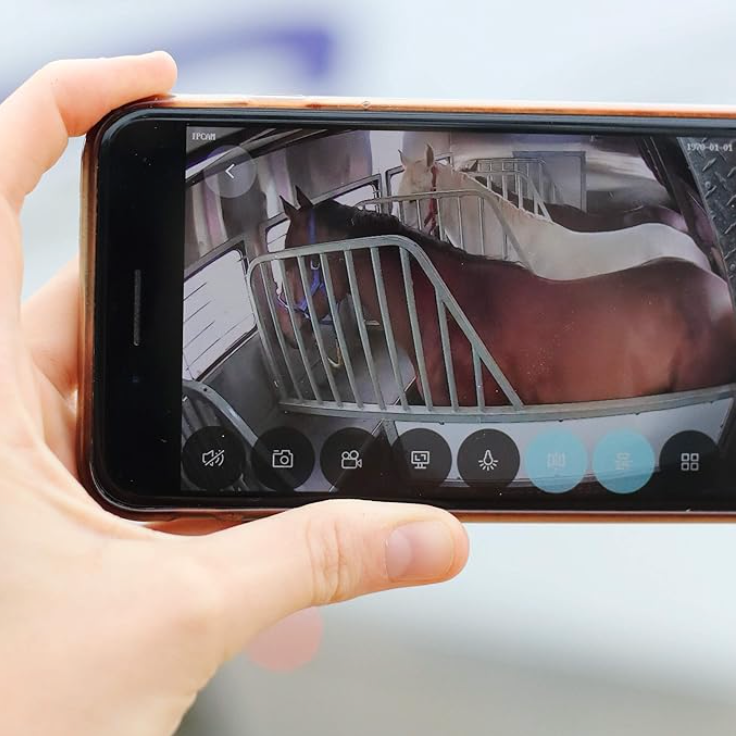
Introduction
Monitoring your horse while hauling is essential for safety. A horse trailer camera system allows you to check on your horse in real-time, helping you spot stress, injuries, or problems during travel. Whether you’re on a short haul or long-distance trip, a trailer camera can give you peace of mind and help you respond quickly to emergencies.
This guide covers what to look for in a horse trailer camera, the best options to buy, and how they typically work.
1. Why Use a Horse Trailer Camera? 🎥🐴
A horse trailer camera allows you to:
✅ Monitor your horse in real-time to check for pawing, sweating, or signs of distress.
✅ Detect problems early, such as a horse slipping or a loose divider.
✅ Reduce stress and guesswork—no more pulling over just to check on your horse.
💡 Pro Tip: A camera does NOT replace stopping for regular checks, but it helps you monitor behavior between stops.
2. Types of Horse Trailer Camera Systems
🔹 Wired Trailer Cameras
- How They Work: A physical wire runs from the camera inside the trailer to a screen in your truck.
- Pros: Reliable signal, no interference, no need for battery changes.
- Cons: More difficult to install since it requires running cables.
🔹 Wireless Trailer Cameras
- How They Work: The camera sends a live feed to a monitor or phone via Wi-Fi or Bluetooth.
- Pros: Easy to install, no wires to run.
- Cons: Potential for signal loss or interference, may require recharging.
💡 Pro Tip: Wireless cameras are the most popular choice for horse trailers due to their ease of installation.
3. Best Horse Trailer Cameras to Buy
🔹 1. Haloview MC7108 Wireless Trailer Camera
📌 Best for: Overall reliability and ease of use.
✅ 7-inch screen for clear viewing.
✅ Long-range signal (up to 1,000 feet) – good for gooseneck and bumper-pull trailers.
✅ Infrared night vision for low-light conditions.
✅ Waterproof and durable.
💲 Price Range: ~$250-$300
🔹 2. Equine Eye Horse Trailer Camera
📌 Best for: A portable, wireless option designed specifically for horse trailers.
✅ Wireless with a rechargeable battery (no need for permanent installation).
✅ Streams video to a mobile device without needing a cellular signal.
✅ Night vision capabilities for 24/7 monitoring.
✅ Easy to move between trailer, barn, or paddock.
❌ User reviews are mixed, with some reporting durability concerns.
💲 Price Range: ~$150-$250
🔹 3. Eyoyo Digital Wireless Trailer Camera
📌 Best for: Budget-friendly wireless option.
✅ 4.3-inch display – smaller screen but clear image.
✅ Rechargeable battery-powered camera (no need for hardwiring).
✅ Works well for smaller trailers but has limited range.
💲 Price Range: ~$120-$180
🔹 4. TadiBrothers Wireless Horse Trailer Camera
📌 Best for: Multiple camera views inside the trailer.
✅ Monitor up to 2-4 cameras at once inside the trailer.
✅ Long-range wireless signal with no lag.
✅ Weatherproof and durable for rough roads.
💲 Price Range: ~$400-$500
🔹 5. RVS-770613 Wired Trailer Camera System
📌 Best for: A wired option for a stable, interference-free connection.
✅ 7-inch HD monitor with ultra-clear display.
✅ No wireless interference (great for long trailers).
✅ Long-lasting durability—ideal for frequent haulers.
💲 Price Range: ~$300-$400
💡 Pro Tip: If you haul long distances or in rough terrain, invest in a dual-camera system to monitor multiple angles inside the trailer.
4. How Horse Trailer Cameras Work
🔹 Installation & Setup
- Wired cameras require running a video cable from the trailer to the truck’s monitor.
- Wireless cameras attach to the trailer and transmit the video feed via Wi-Fi or Bluetooth to a screen or smartphone.
🔹 How Do You View the Feed?
📌 Built-in monitor: Most systems come with a dedicated screen for your truck’s dashboard.
📌 Smartphone app: Some cameras connect via Wi-Fi to stream directly to your phone.
💡 Pro Tip: Test your camera before your trip to ensure the connection is clear.
5. Key Features to Look for in a Horse Trailer Camera
When choosing a camera, consider these must-have features:
✅ Night Vision: Allows you to see inside the trailer even in the dark.
✅ High-Quality Video: Look for HD resolution to easily see your horse’s condition.
✅ Weatherproof Design: Make sure the camera is dustproof, waterproof, and vibration-resistant.
✅ Strong Wireless Signal (for wireless models): Must reach at least 500 feet to ensure stable connectivity.
✅ Easy Installation: Wireless systems are plug-and-play, while wired systems require professional installation.
6. FAQs About Horse Trailer Cameras
🔹 Do I need a Wi-Fi connection for a wireless camera?
No. Most horse trailer cameras create their own private Wi-Fi network to transmit video, so you don’t need internet or cell service.
🔹 How do wireless trailer cameras get power?
Some models plug into a power source, while others run on rechargeable batteries. Always check battery life if using a battery-powered system.
🔹 How do I prevent signal interference?
- Choose a camera with a strong signal range (500-1000 feet).
- Avoid using cameras that rely on Bluetooth—Wi-Fi-based systems tend to be more reliable.
- Test before your trip to ensure a clear feed.
🔹 Can I install a camera myself?
Yes! Wireless cameras are plug-and-play and require minimal setup. Wired cameras take more effort to install but provide a stable, interference-free connection.
Final Thoughts
A horse trailer camera is a game-changer for safe and stress-free hauling. Whether you choose a wireless option like the Equine Eye or a stable wired system like the RVS-770613, having a live view of your horse ensures peace of mind on the road

